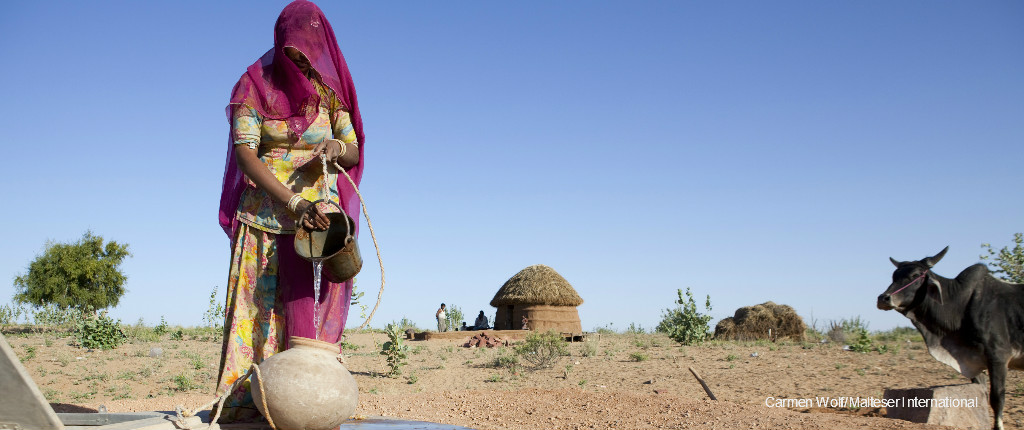
Improving food security in the Thar Desert
Despite steady economic development and comprehensive government programs, one in every three children in India still suffers from malnutrition, according to the government of India. The number of undernourished children under the age of five and women is particularly high in rural and socially disadvantaged regions where hygiene conditions are poor.1 The Covid-19 pandemic and its effects further exacerbate the living conditions of many.
In partnership with the Indian organization UNNATI, we are working to improve food security in 50 villages in the arid Thar desert by helping local farmers adapt to climate change through their cultivation methods. In addition to campaigns on healthy nutrition and hygiene to prevent malnutrition, UNNATI trains socially vulnerable communities as they apply for and receive state benefits from government-run food security and health programs.
To continue our support for people during the Covid-19 pandemic, we have expanded our assistance to include measures that contain the spread of the virus, promote awareness on vaccinations and establish livelihoods to overcome acute financial constraints.
1 Source
One out of three children in India is underweight, while many women from vulnerable sections of the society still suffer from undernourishment. During pregnancy, this affects both the pregnant woman and the developing child in the short and long term.
Diarrheal and worm infections from dirty waters coupled with unhealthy sanitary conditions increase the risk of undernourishment.
Rajasthan is India's largest state by area. Most of the region is covered by the Thar Desert with a large part of the local population living in rural areas. Malteser International's activities are concentrated in the western part of Rajasthan, encompassing 50 villages in the socially disadvantaged Barmer District. The district is also prone to extreme weather events. Barmer District has an average rainfall of 210 millimeters, and every slight change in the distribution of rainfall results in periods of drought. This makes life difficult for the small-scale farmers who cannot afford irrigation systems.
Current government programs on food security, health and social security are insufficiently taken up by the local communities, among which women and girls are the most vulnerable.
The rural populations in the Thar desert are particularly affected by the economic consequences of the Covid-19 pandemic. Many people have lost their source of income due to curfews set in 2020. Moreover, the number of infected people saw a rapid increase after the mutation of the delta variant, driving the healthcare system to its limits and into a state of emergency.
The project aims to improve food security in 50 villages (approx. 10,000 people) in the Thar Desert region of Rajasthan, thereby strengthening resilience of communities against hunger crises. Through comprehensive interventions, Malteser International and UNNATI are working together with communities to provide access to food and maximize food usage.
Concrete project objectives include:
- Healthy nutrition and better hygiene, especially for women and young girls
- Improved access to governmental programs with a focus on food security and health
- Improved cultivation methods of local farmers
- Institutional strengthening and support of female farmer organizations
Covid-19 related objectives:
- Contained spread of the virus
- Increased awareness of Covid-19, protective measures and vaccinations
- Generation of income and overcoming of acute liquidity shortages
- Training of female nutritionists and WASH officers
- Awareness campaigns on healthy nutrition and hygiene for girls, pregnant, and nursing women
- Monitoring the provision of state services by women and girls
- Operation of two information offices on governmental social programs in Patodi and Sindhri
- Advocacy with local authorities to ensure effective implementation of government efforts
- Provision of trainings for women and girls to act as multipliers for social programs
- Cultivation of 200 horti-pasture plots with nutrition gardens
- Support female local farmers with the cultivation of livestock
- Trainings for agricultural counsellors
- Support female farmer organizations with the scaffolding of a legal form through trainings, monitoring and peer learning
Covid-19 related objectives:
- Support health workers in awareness campaigns, monitoring of safety measures, testing and isolating of positive cases
- Hire nursing staff to assist with Covid-19 awareness and vaccination counselling
- Procurement of face masks and gloves for health workers, teachers and childcare workers
- Establishment of transport services for the elderly, pregnant women, persons with disabilities and isolated populations to ensure access to vaccinations
Project data
Donors: German Federal Ministry for Economic Cooperation and Development (BMZ), private donations
Partner: Organisation for Development Education (UNNATI)
Country info
Capital: New Delhi
Area: 3,288,000 km²
Population: approx. 1.41 billion








